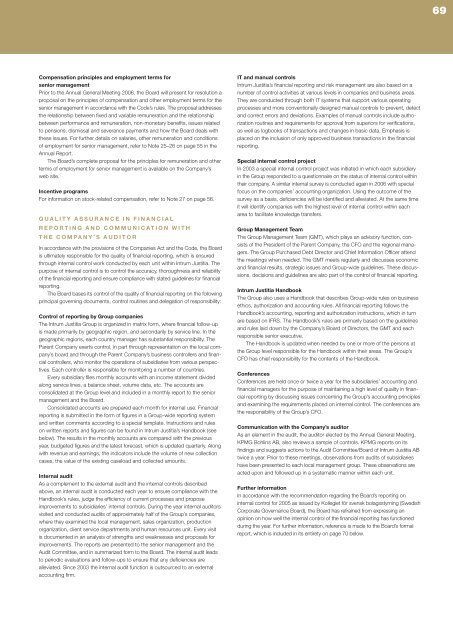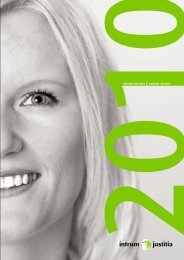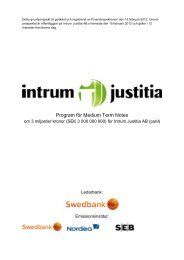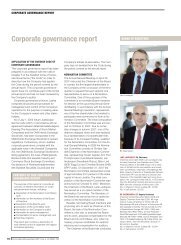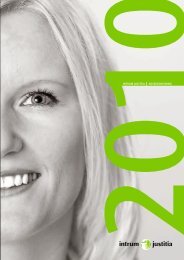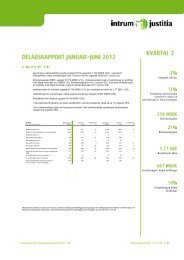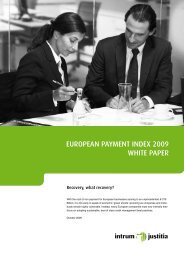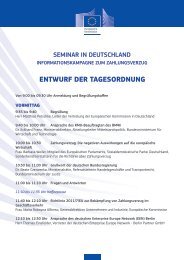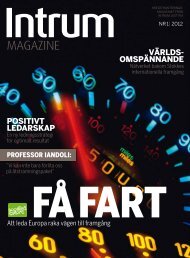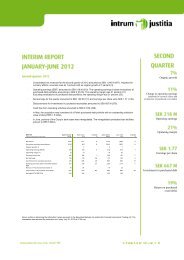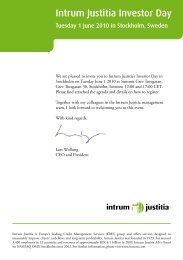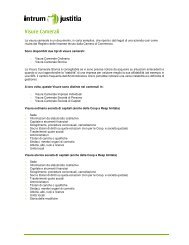Create successful ePaper yourself
Turn your PDF publications into a flip-book with our unique Google optimized e-Paper software.
Compensation principles and employment terms for<br />
senior management<br />
Prior to the Annual General Meeting 2006, the Board will present for resolution a<br />
proposal on the principles of compensation and other employment terms for the<br />
senior management in accordance with the Code’s rules. The proposal addresses<br />
the relationship between fi xed and variable remuneration and the relationship<br />
between performance and remuneration, non-monetary benefi ts, issues related<br />
to pensions, dismissal and severance payments and how the Board deals with<br />
these issues. For further details on salaries, other remuneration and conditions<br />
of employment for senior management, refer to Note 25–26 on page 55 in the<br />
Annual Report.<br />
The Board’s complete proposal for the principles for remuneration and other<br />
terms of employment for senior management is available on the Company’s<br />
web site.<br />
Incentive programs<br />
For information on stock-related compensation, refer to Note 27 on page 56.<br />
QUALITY ASSURANCE IN FINANCIAL<br />
REPORTING AND COMMUNICATION WITH<br />
THE COMPANY’S AUDITOR<br />
In accordance with the provisions of the Companies Act and the Code, the Board<br />
is ultimately responsible for the quality of fi nancial reporting, which is ensured<br />
through internal control work conducted by each unit within <strong>Intrum</strong> <strong>Justitia</strong>. The<br />
purpose of internal control is to control the accuracy, thoroughness and reliability<br />
of the fi nancial reporting and ensure compliance with stated guidelines for fi nancial<br />
reporting.<br />
The Board bases its control of the quality of fi nancial reporting on the following<br />
principal governing documents, control routines and delegation of responsibility:<br />
Control of reporting by Group companies<br />
The <strong>Intrum</strong> <strong>Justitia</strong> Group is organized in matrix form, where fi nancial follow-up<br />
is made primarily by geographic region, and secondarily by service line. In the<br />
geographic regions, each country manager has substantial responsibility. The<br />
Parent Company exerts control, in part through representation on the local company’s<br />
board and through the Parent Company’s business controllers and fi nancial<br />
controllers, who monitor the operations of subsidiaries from various perspectives.<br />
Each controller is responsible for monitoring a number of countries.<br />
Every subsidiary fi les monthly accounts with an income statement divided<br />
along service lines, a balance sheet, volume data, etc. The accounts are<br />
consolidated at the Group level and included in a monthly report to the senior<br />
management and the Board.<br />
Consolidated accounts are prepared each month for internal use. Financial<br />
reporting is submitted in the form of fi gures in a Group-wide reporting system<br />
and written comments according to a special template. Instructions and rules<br />
on written reports and fi gures can be found in <strong>Intrum</strong> <strong>Justitia</strong>’s Handbook (see<br />
below). The results in the monthly accounts are compared with the previous<br />
year, budgeted fi gures and the latest forecast, which is updated quarterly. Along<br />
with revenue and earnings, the indicators include the volume of new collection<br />
cases, the value of the existing caseload and collected amounts.<br />
Internal audit<br />
As a complement to the external audit and the internal controls described<br />
above, an internal audit is conducted each year to ensure compliance with the<br />
Handbook’s rules, judge the effi ciency of current processes and propose<br />
improvements to subsidiaries’ internal controls. During the year internal auditors<br />
visited and conducted audits of approximately half of the Group’s companies,<br />
where they examined the local management, sales organization, production<br />
organization, client service departments and human resources unit. Every visit<br />
is documented in an analysis of strengths and weaknesses and proposals for<br />
improvements. The reports are presented to the senior management and the<br />
Audit Committee, and in summarized form to the Board. The internal audit leads<br />
to periodic evaluations and follow-ups to ensure that any defi ciencies are<br />
alleviated. Since 2003 the internal audit function is outsourced to an external<br />
accounting fi rm.<br />
IT and manual controls<br />
<strong>Intrum</strong> <strong>Justitia</strong>’s fi nancial reporting and risk management are also based on a<br />
number of control activities at various levels in companies and business areas.<br />
They are conducted through both IT systems that support various operating<br />
processes and more conventionally designed manual controls to prevent, detect<br />
and correct errors and deviations. Examples of manual controls include authorization<br />
routines and requirements for approval from superiors for verifi cations,<br />
as well as logbooks of transactions and changes in basic data. Emphasis is<br />
placed on the inclusion of only approved business transactions in the fi nancial<br />
reporting.<br />
Special internal control project<br />
In 2003 a special internal control project was initiated in which each subsidiary<br />
in the Group responded to a questionnaire on the status of internal control within<br />
their company. A similar internal survey is conducted again in 2006 with special<br />
focus on the companies’ accounting organization. Using the outcome of the<br />
survey as a basis, defi ciencies will be identifi ed and alleviated. At the same time<br />
it will identify companies with the highest level of internal control within each<br />
area to facilitate knowledge transfers.<br />
Group Management Team<br />
The Group Management Team (GMT), which plays an advisory function, consists<br />
of the President of the Parent Company, the CFO and the regional managers.<br />
The Group Purchased Debt Director and Chief Information Offi cer attend<br />
the meetings when needed. The GMT meets regularly and discusses economic<br />
and fi nancial results, strategic issues and Group-wide guidelines. These discussions,<br />
decisions and guidelines are also part of the control of fi nancial reporting.<br />
<strong>Intrum</strong> <strong>Justitia</strong> Handbook<br />
The Group also uses a Handbook that describes Group-wide rules on business<br />
ethics, authorization and accounting rules. All fi nancial reporting follows the<br />
Handbook’s accounting, reporting and authorization instructions, which in turn<br />
are based on IFRS. The Handbook’s rules are primarily based on the guidelines<br />
and rules laid down by the Company’s Board of Directors, the GMT and each<br />
responsible senior executive.<br />
The Handbook is updated when needed by one or more of the persons at<br />
the Group level responsible for the Handbook within their areas. The Group’s<br />
CFO has chief responsibility for the contents of the Handbook.<br />
Conferences<br />
Conferences are held once or twice a year for the subsidiaries’ accounting and<br />
fi nancial managers for the purpose of maintaining a high level of quality in fi nancial<br />
reporting by discussing issues concerning the Group’s accounting principles<br />
and examining the requirements placed on internal control. The conferences are<br />
the responsibility of the Group’s CFO.<br />
Communication with the Company’s auditor<br />
As an element in the audit, the auditor elected by the Annual General Meeting,<br />
KPMG Bohlins AB, also reviews a sample of controls. KPMG reports on its<br />
fi ndings and suggests actions to the Audit Committee/Board of <strong>Intrum</strong> <strong>Justitia</strong> AB<br />
twice a year. Prior to these meetings, observations from audits of subsidiaries<br />
have been presented to each local management group. These observations are<br />
acted upon and followed up in a systematic manner within each unit.<br />
Further information<br />
In accordance with the recommendation regarding the Board’s reporting on<br />
internal control for 2005 as issued by Kollegiet för svensk bolagsstyrning (Swedish<br />
Corporate Governance Board), the Board has refrained from expressing an<br />
opinion on how well the internal control of the fi nancial reporting has functioned<br />
during the year. For further information, reference is made to the Board’s formal<br />
report, which is included in its entirety on page 70 below.<br />
69


